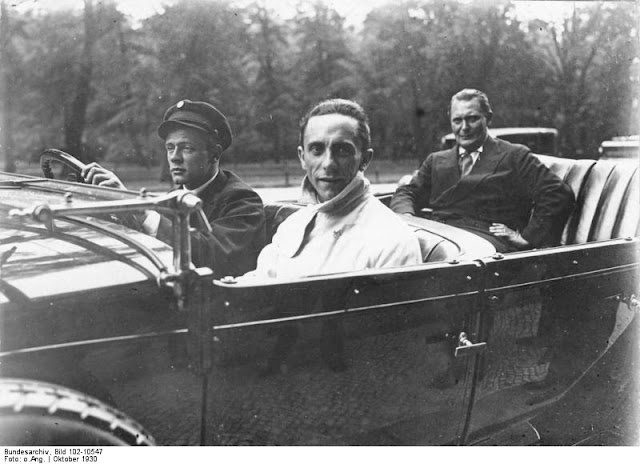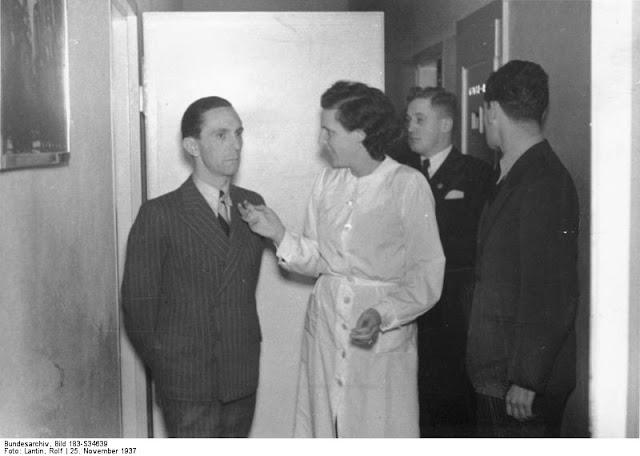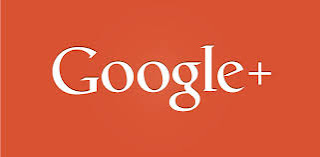We have made the Reich by propaganda.
--JOSEPH GOEBBELS
“If you tell a lie big enough and keep repeating it, people will eventually come to believe it. The lie can be maintained only for such time as the State can shield the people from the political, economic and/or military consequences of the lie. It thus becomes vitally important for the State to use all of its powers to repress dissent, for the truth is the mortal enemy of the lie, and thus by extension, the truth is the greatest enemy of the State.”
--JOSEPH GOEBBELS
He controlled the minds of millions of Germans. It is doubtful whether Hitler's Third Reich could have lasted this long without Goebbels wizardry. When it comes to propaganda and mind-washing on a mass scale there will never be another one to surpass this little man who was an important cog in a juggernaut that was Nazi Germany.
Dr. Joseph Goebbels - one of the most prominent personalities of the twentieth century. Minister of Public Enlightenment and Propaganda of the Third Reich. Throughout the long twelve years of his ministry he was to decide what would appear on the front page headlines, what songs would be performed in a radio broadcast, which films would be released in cinemas and what would be the repertoire on the stage. Largely thanks to the Ministry of Propaganda the Germans continued to fight on the Eastern Front until the end, even after the outcome of the war was obvious to everyone. Many Germans, who could not flee to the rear, committed suicide. And he, Goebbels and his wife too committed suicide by poisoning after killing their six children.
---------------------
“Think of the press as a great keyboard on which the government can play.”
---------------------
 |
| Goebbels with Goering in 1930 |
Future Reich Chancellor (albeit for a day) was born October 28, 1897 in a town in Rhineland called Reydt to a pious family bookkeeper. His father dreamed that the young Joseph become a Catholic priest, but his son wanted to become a writer and playwright. With the financial support of the Catholic "Society of Albert Magnus," he finished a course of humanities in almost all major German universities. In April 21, 1922 after defending his thesis "Wilhelm von Schutz as a playwright. On the History of the romantic school drama" Goebbels received his Ph.D. at Heidelberg University. World War One did not interrupt Goebbels' studies as he was found unfit for military service because of a birth defect - lameness (one leg shorter than the other). As a playwright, of which he dreamed of becoming, he was unsuccessful - he wrote the play "The Wanderer" ("Der Wanderer") but no one wanted to put it on stage. Goebbels did not succeed as a writer too- the novel "Michael", which told the plight of Germany, did not generate interest from publishers. The novel was completed in 1924, and he managed to publish it only five years later, when he was already a well-known politician, journalist, and a member of the Reichstag. Until 1924 Goebbels had to earn a living, working a modest bank clerk.
---------------------------
“If the German people lay down their weapons, the Soviets, according to the agreement between Roosevelt, Churchill and Stalin, would occupy all of East and Southeast Europe along with the greater part of the Reich. An iron curtain would fall over this enormous territory controlled by the Soviet Union, behind which nations would be slaughtered.”
----------------------------
 |
| For someone espousing the superior Aryan race, Goebbels himself hardly fitted the ideal model. (H. Dobhenysk, A Pure-Blooded Aryan, Chicago Daily News (1937) |
In 1923, after the Beer Hall Putsch (November 9, 1923) - attempt to seize power in Bavaria, the whole of Germany learned of the existence of the National Socialist German Workers' Party, led by Adolf Hitler. Hitler used the ensuing trial to tell the whole country about himself, his party and his views. And Goebbels decided that this party (officially banned after the trial) suited him. By 1924 the Department of the NSDAP came to his hometown and he did not hesitate to join the party (party ticket number 8762).
---------------------------
Recounting his day in a diary entry:]
Goebbels wrote "At table the Führer made another strong plea for vegetarianism. I consider his views correct. Meat-eating is a perversion of our human nature. When we reach a higher level of civilization, we shall doubtlessly overcome it."
---------------------------
 |
| Hitler and Goebbels at a film studio in 1935 |
The Nazi Party at the time had a strong left wing - part of the Nazis led by Gregor Strasser perceived the word "socialist" too seriously in the name of the Nazi Party. The radical socialist and frustrated writer and playwright joined this wing. Strasser entrusted the editorial post in his newspaper "HC-Brief."to this young man Meanwhile, in December 1924, after spending a year of his prison term Adolf Hitler came out to freedom. Towards Socialism his attitude was more than cool and disputes broke out between his supporters and followers of Strasser. In the course of this debate radically minded Goebbels came to exclude "bourgeois Hitler" from party ranks. But in 1926, after a personal meeting with Hitler, Goebbels unconditionally moved to his side. The tone of his articles changed dramatically - his articles turned into odes of praise to the leader. And Hitler appreciated the flow of praise - in October of 1926 he appointed his new admirer Gauleiter (head of the party cell) of Berlin. It is difficult to say whether Goebbels was pleased with the honor - Berlin with its vast working-class district was traditionally a "red" city. The NSDAP Party branch in the capital consisted of only a thousand people and nearly all of them were supporters of Strasser. The party budget consisted of only debts. Goebbels did a strong purge of party ranks and expelled nearly a thousand people from the party . But due to the number of new supporters of the Nazis in Berlin the party was growing steadily. Goebbels organized rallies and the fight against the communists. Later on this period of his political career, he wrote a book "The Struggle for Berlin" (Kampf um Berlin, 1934).
---------------------------------
"I have noticed a slight element of cynicism creeping into our reporting of the war. ... I put a stop to this. ... Our style for this war must be hard, manly, unsentimental, sober, but without smart Alec cleverness. Sarcasm can only harm things."
----------------------------------
 |
| Goebbels gives a speech during a visit by Mussolini in 1937 |
The growing popularity of the Nazis and their leader in Berlin alarmed the powers in Berlin. On May 5, 1927 the Nazi Party and the SA troops in Berlin were banned, and Goebbels was forbidden to make any public appearance in the city. However, the ban did not prevent Goebbels from engaging in publishing - he produced the weekly "Angriff." He raised a protest campaign in the press which led to the resignation of the chief of criminal police of the Berlin, a Jew called Weiss. Also in 1927 a Sturmfuhrer (captain) of the SA, a novice poet named Horst Wessel put to tune an old German song «Der Abenteurer» («The Adventurer"). His words were about invisible fallen heroes. The result was a cheerful marching song which attacked the Communists. Maybe this song would have remained a local Berlin hit, which no one would have remembered now, but because of Goebbels at least the name of the song is known around the world. In 1930, the author himself joins "serried ranks of the fallen heroes," being shot by a communist. Goebbels turned Horst Wessel into a symbol of struggle and martyrdom, and the song became the official anthem of the party (after January 30, 1933. It also became part of the state Anthem, which consisted of two parts - one verse of "German Song", followed by the first verse of "Horst Wessel"). In 1932, Goebbels used the same propaganda tool at the death of Herbert Norkus, a teenager of the Hitler Youth. Immediately after the Nazis came to power in the summer of 1933, UFA Cinema promptly released two films devoted to these heroes - "Hans Westmar - one of many" and "Hitlerjunge Quex."
------------------------
"[I] tone down the grotesque exaggerations - 'London a sea of flames', etc. - which ... can only harm us in the future. We must not arouse hopes if they cannot be fulfilled immediately."
------------------------
 |
| Joseph and Magda Goebbels with their children. All of them were given cyanide on May 1, 1945 |
But back to "fight for Berlin." The ban on the Nazi party did not last a year; On May 31, 1928 it was removed. And it April 20, 1928, Goebbels entered the Reichstag from the city of Berlin. On January 9, 1929 to the office of Berlin Gauleiter Goebbels added post of imperial head of propaganda (Reichspropagandaleiter) in his resume. One of the "achievements" of Goebbels in office, if it can be called that, in December 1930, he put a the German ban on the famous novel by Erich Remarque "On the Western Front."
In 1932, he persuaded Hitler to stand for election for Reich President. Hitler initially refused. And besides, he was not able to stand for the any election - he did not have German citizenship. After the "Beer Hall Putsch" in fear of deportation to his home country, he had refused Austrian citizenship and German authorities were in no hurry to provide him with citizenship. But February 25, 1932 the Minister of the Interior appointed Hitler Braunschweig attache in Berlin office of the land, and the assignment of such a position meant automatic granting of German citizenship. Goebbels managed the presidential campaign of Hitler and Hitler came in second with 30.1% of the vote (the first went to Paul von Hindenburg - 49.6% of the vote). In 1932 Germany chose not only the head of state, but held elections to the Reichstag twice, within an interval of less than six months - June 4 and 6 November, . If the presidential election, Hitler took the second place, in the parliamentary polls the Nazis did better; 37.8% of the votes (230 seats) in June. In November gains were not so significant - the Nazis got only 196 seats. But by the time the Germans were tired of endless elections. Be that as it may, under the constitution of the Weimar Republic, a government could be build by a party (or coalition of parties) only if they had more than 50% of the votes in the Reichstag elections. . But in the same year an important change was made to the Constitution. Now the Reich President (Head of State) could freely appoint the chancellor (prime minister) . Hindenburg appointed Adolf Hitler Chancellor on January 30, 1933 . On March 13 of that year, Goebbels was made Minister of Public Enlightenment and Propaganda.
---------------------------
WHAT OTHERS SAID ABOUT GOEBBELS
Ribbentrop: "I admired Goebbels who was the most intelligent of the whole [Nazi] circle. He was a genial, but nevertheless diabolical person."
Albert Speer: "[My first impression of Goebbels' speech-making was] much phrase-making, careful structure, and incisive formulations; a roaring crowd whom Goebbels whipped up to wilder and wilder frenzies of enthusiasm and hatred; a witches' cauldron of excitement. ... I felt repelled."
Albert Speer: "Both Goebbels and Hitler had understood how to unleash mash instincts at their meetings, how to play on the passions that underlay the veneer of ordinary respectable life. Practiced demagogues, they succeeded in fusing the assembled [people] into a homogeneous mob whose opinions they could mold as they pleased."
Alfred Krebs: "[Goebbels] spoke with enthusiasm about cultural and artistic matters [and] skirted around political matters."
John Keegan: "Like Hitler, he was also a passionate devotee of the cinema, but, while the Führer used the medium chiefly as a means of personal relaxation, Goebbels understood and seized on its power to sway the national imagination."
John Keegan: "Hitler ... lacked the [inclination] for anything more than the occasional sensational display of emotion, in particular the great set-piece speech which mesmerized the mob and left him drained of nervous energy. Goebbels, on the other hand, though a galvanic speaker in his own right, directed his overflowing energy into the day-by-day and minute-by-minute [communication]."
John Keegan: "Goebbels' [method] was anti-rational and emotive in every regard."
John Keegan: "Like Hitler, Goebbels believed in the primacy of the spoken word over the written word as an instrument of thought control."
-----------------------------------------
 |
| Goebbels discusses war propaganda in 1941 |
And Goebbels immediately began to direct the "new order" of cultural life in Germany. Books imbued with "non-German spirit were removed from the library book, .The list of harmful books totaled 14,000 names and 141 German authors. On May 10, 1933, many of these books were burnt in huge bonfires. Goebbels while fighting for control of the press had to fight with Max Amann, who held the post of head of the Imperial Printing and Publishing Director of Central NSDAP "Eher Verlag". in the case of art Alfred Rosenberg tried to interfere. But Goebbels' powers were increasing - September 22, 1933 the Imperial House of Culture was created to which all the representatives of creative professions had to come Two years later to the House of Culture was added the Imperial Senate culture (of course, also headed by Goebbels). May 14, 1934 all the theaters in Germany went under the control of Goebbels. Goebbels controlled the process of making movies from the stage of writing of the script. For the press releases he issued lengthy briefings containing detailed instructions how to cover certain events in the life of Germany and beyond.
Goebbels used his position to know the whole of Germany - he often started a romance with film and stage actresses. True, not everyone took his importunate courtship. For example, the famous actress and director Leni Riefenstahl did not return his affections. But the rift with the powerful minister of propaganda had no effect on her brilliant career - among her fans was the Fuhrer himself. It was he who instructed her in the making of the 1934 film about the Nuremberg Party Congress. The film "Victory of Faith", however, had to be put on a shelf - there were too many of Ernst Röhms, who was killed during the "Night of the Long Knives". But a year later, Riefenstahl shot a new film about the next Congress - "Triumph of the Will," acknowledged as a classic of world documentary.
-------------------------
GOEBBELS ON JEWS
A Jew is for me an object of disgust. I feel like vomiting when I see one. Christ could not possibly have been a Jew. It is not necessary to prove that scientifically - it is a fact.
I am of the opinion that the greater the number of Jews liquidated, the more consolidated will the situation in Europe be after this war.
------------------------
 |
| A taut and uneasy Goebbels with Leni Riefenstahl |
In 1938, the Office of Goebbels started to prepare for the inevitable war. General Keitel and Goebbels entered into an agreement governing the conduct of propaganda in wartime. And in the same year, start making propaganda for the troops . Goebbels formed a propaganda company with a staff of 115 people. The Company consisted of photographers, artists, cameramen and reporters. All of them had passed military training. Welcome and the presence of military specialties - for people who knows the military equipment will not allow in his report annoying bugs. So, among the promoters were representatives of all the armed forces.
That army of propagandists during the war made the famous newsreel Die Deutsche Wochenschau (German weekly review), which appeared in 1940. Prior to that in Germany there were as many as four newsreels - Ufa-Tonwoche, Deulig-Tonwoche, Fox Tönende Wochenschau and Emelka-Tonwoche, a legacy from the time of the Weimar Republic. They were then produced by different private film companies. Under Hitler they were brought under strict control of the German weekly news center at the Ministry of Public Enlightenment and Propaganda (Deutsche Wochenschauzentrale beim Reichsministerium für Volksaufklärung und Propaganda). And with the beginning of the war to facilitate the production of newsreels, instead of four only one newsreel was made of 45 minutes duration. It had a print run of 2,000 copies and it was mandatory to be exhibited before each film show. A thousand copies were printed for foreign visitors. The newsreel was translated into 15 European languages. 1,200 meters of film was required for one edition of the newsreel, but the creators of spectacular scenes selected the best shots from the tens of thousands of meters of film footage, shot by front-line news-photographers. This newsreel was the favorite brain child of Joseph Goebbels.
Meanwhile, to the official posts of Goebbels was added another. On November 16, 1942 he became the Imperial Commissioner for the defense of Berlin. The Battle of Berlin was still far away, but the intensity of the Allied air raids on the capital of the Third Reich was growing every day..The failed coup of 20 July 1944 contributed to the growing power of Goebbels.
 |
Goebbels calls for all out war at the Berlin Sports Palace on February 18, 1943
|
On February 18, 1943 in his famous speech at the Berlin Sports Palace he called for an all-out war. On July 25, 1944 he became the imperial commissioner for total war - he organized the Volkssturm units. The Third Reich began to throw to the front, old men and teenagers - its last reserve. Goebbels' office in every way created a terrible image of the enemy - the bloodthirsty savages from the East who robbed, raped and murdered. In 1943, Goebbels gave extensive instructions (in ten typed pages) to the press about how to cover the execution of Polish officers in the Katyn Forest. In October 1944, the Soviet forces held Nemmersdorf, a German town in East Prussia, for several days On October 23 Germans recaptured this town and found 11 bodies of executed civilians. Through the efforts of Joseph Goebbels the incident was turned into a real massacre - the number of victims increased by 6 times. All the women in Nemmersdorf were allegedly raped, murdered, and their mutilated bodies nailed to doors. The continuous hysteria in the press because of Goebbels cost the lives of thousands of German women and children. At the approach of Soviet troops many German women and girls were killed by their husbands and fathers. Many committed suicide.
--------------------------
"If the day should ever come when we [the Nazis] must go, if some day we are compelled to leave the scene of history, we will slam the door so hard that the universe will shake and mankind will stand back in stupefaction..."
-------------------------
 |
| Last image taken of Goebbels on March 9, 1945 |
On May 1, 1945 Joseph and Magda Goebbels poisoned with cyanide their six children. Goebbels shot his wife and killed himself.
RELATED
JOSEPH GOEBBELS: The man behind Adolph Hitler
Goebbels' Last Speech
Love of master Nazi propagandist Goebbels: LIDA BAAROVA































